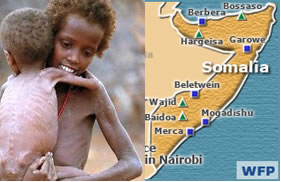fiogf49gjkf0d
Sagal Hersi
Monday, May 12, 2008
 It is official; Somalia is in the throes of food crisis that may affect the lives of millions of Somalis. Global crisis caused by rising food and fuel prices, unchecked inflation and droughts have compounded to make the lives of people living in Somalia unbearable. The Food and Agriculture Organization of the United Nations, states that about 2.6 million Somalis are experiencing severe food shortages and depend on assistance at the moment. This number is expected to increase to more than 3 million by the end of the year.
It is official; Somalia is in the throes of food crisis that may affect the lives of millions of Somalis. Global crisis caused by rising food and fuel prices, unchecked inflation and droughts have compounded to make the lives of people living in Somalia unbearable. The Food and Agriculture Organization of the United Nations, states that about 2.6 million Somalis are experiencing severe food shortages and depend on assistance at the moment. This number is expected to increase to more than 3 million by the end of the year.
The global food crisis and its subsequent affects have taken everyone by surprise. Since January, the price of rice has risen by 141%, while wheat prices have climbed by 25%. While the reasons for this food crisis are multifaceted, ranging from increased demands by Chinese and Indian populations to droughts experienced by the world’s leading wheat and rice producers, the affects of this crisis have been uniform around the world. Protests against the increasing costs of food have taken place in Haiti, Indonesia, the Philippines, Egypt, and Bangladesh. In the case of Haiti, these protests turned violent, claiming the lives of six people and bringing down the government of Prime Minister, Jacques Eduard Alexis.
For all intents and purposes, Indonesia, the Philippines and Egypt are developed countries that have higher GDPs compared to Somalia. Yet, the governments of these countries are having difficult time in dealing with these crises. According to Joachim von Braun, head of the International Food Policy Research Institute in Washington, ‘world agriculture has entered a new, unsustainable and politically risky period.’ So how does Somalia, a country in the midst of an eighteen year old civil war, with no effective government and destroyed infrastructure coupled with a violent insurgency deal with a crisis of this magnitude? The simple answer is that it cannot.
Humanitarian efforts by NGOs who are dealing with this situation have been frustrated in Somalia by the continued violent attacks by Al-Shabaab militias and subsequent retaliation of the joint Ethiopian and TFG troops. Just few days ago, a worker for the UN World Food Programme was killed in Mogadishu by Al-Shabaab militias, making this the second attack on humanitarian workers in the last couple of months. If these attacks continue, it is very likely that the WFP and other agencies will suspend their programs citing lack of security and thus, millions of Somalis who depend on food subsistence provided by these NGOs are going to suffer on a large scale never seen before.
This is not about whether you support Al-Shabaab militias, Ethiopia or the TFG; rather, it is simply a matter of uniting and coming together in a time of crisis caused by rising food costs, drought and high inflation. While the rest of the world struggles to deal with this situation, we Somalis are busy killing one another and obstructing the efforts of those attempting to help us. We are dealing with urgent issues that are far more important than criticizing and attempting to overthrow the TFG at the moment. It is high time that Somalis put aside their petty political differences, ideologies and blind support for clan affiliation; so that we can Allah willing, adequately deal with this crisis facing our nation.
Works cited
Food Security Analysis Unit for Somalia Press Release, April 30, 2008.
“The New Face of Hunger.” The Economist, April 17, 2008.
Sagal Hersi
E-mail: [email protected]